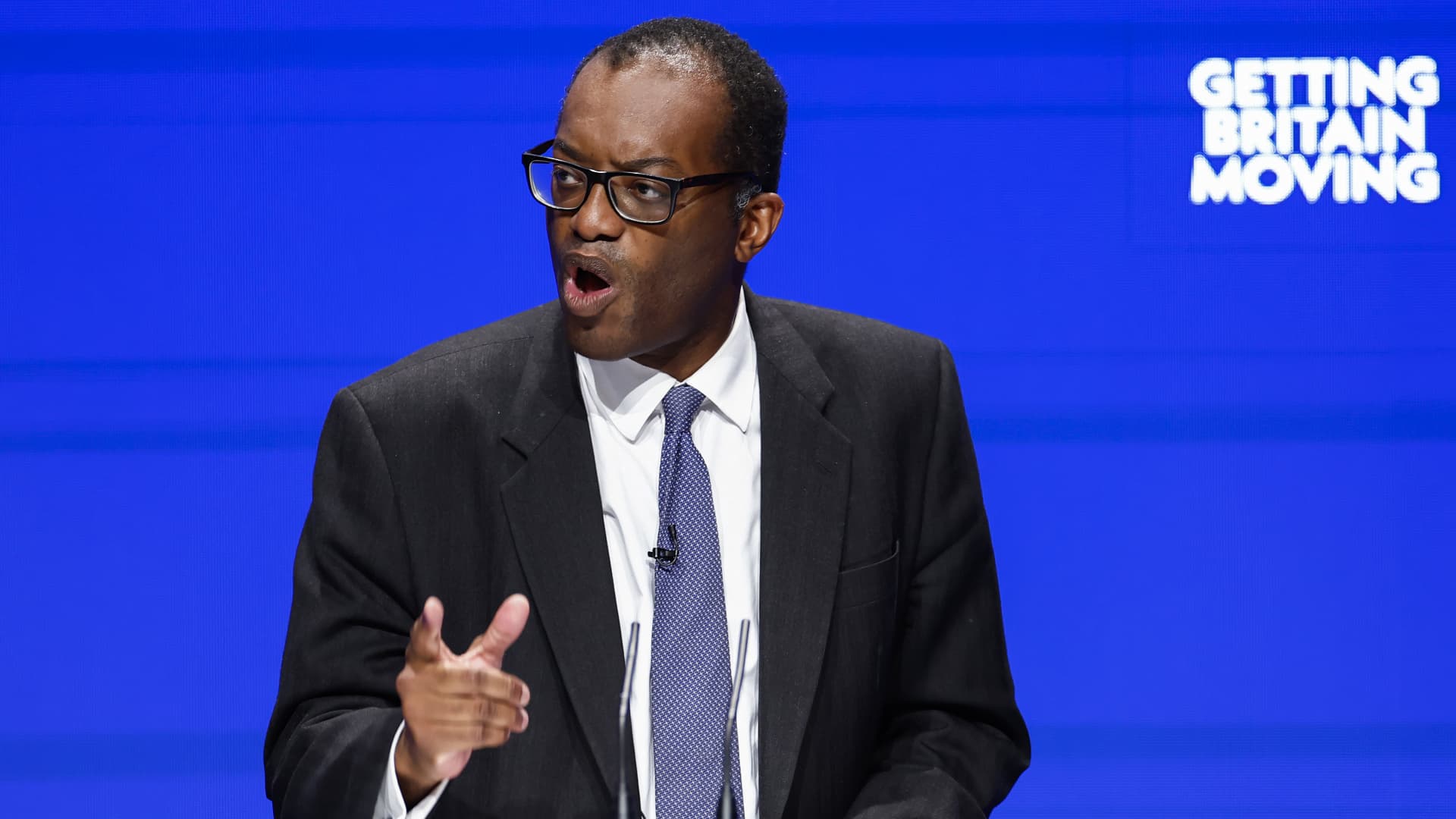British finance minister races back to London as pressure builds for another policy U-turn

Kwarteng on Monday sought to assuage lingering concerns by bringing forward the date of his plan to balance the government’s finances to Oct. 31.
Ian Forsyth | Getty Images News | Getty Images
LONDON — U.K. Finance Minister Kwasi Kwarteng cut short his visit to the International Monetary Fund this week, dashing back to London amid reports Prime Minister Liz Truss is considering a U-turn on parts of her government’s market-rocking tax cuts.
Kwarteng told reporters Thursday that he was returning from the U.S. ahead of schedule, without providing further details. Reuters reported, citing unnamed sources, that the finance minister planned to meet with colleagues to work on the government’s medium-term budget plan.
Earlier, Kwarteng insisted that he is “not going anywhere” and that he and Truss would “100%” still be in their jobs next month.
Kwarteng’s abrupt departure from a series of international finance meetings in Washington, D.C. comes amid a growing political backlash against the Conservative government’s proposed tax cuts.
The debt-funded measures, announced on Sept. 23 and estimated to total £43 billion ($48.7 billion), sent financial markets into a tailspin. The British pound plummeted to an all-time low against the U.S. dollar, borrowing costs rose sharply and the Bank of England was forced to intervene.
Sky News reported Thursday that discussions were underway in Downing Street over whether to reconsider some of the tax cuts that Kwarteng announced in the government’s so-called “mini-budget.” It is thought changes to corporation tax and dividend tax could be in the cards.
Sterling popped on the news.
The British pound rose by 2% to trade at $1.1319 on Thursday, shrugging off stronger-than-expected U.S. inflation data. Sterling was last seen trading down 0.3% at $1.129.
Meanwhile, long-dated U.K. government bonds — known as gilts — rallied on Friday morning, with 30-year yields trading at 4.38%.
Truss is under immense pressure to rethink her economic policies as opinion polls show support for her government has collapsed.
Jacob King | Pa Images | Getty Images
Truss and Kwarteng have repeatedly defended the government’s radical spending plan, insisting the proposals are necessary to stimulate economic growth.
Last week, Kwarteng reversed a plan to scrap the top 45% rate of income tax paid on earnings above £150,000 ($167,646) a year.
Speaking from the U.S. on Thursday, Kwarteng responded to questions about a possible U-turn by saying he is “totally focused on delivering the growth plan.”
However, Truss is under immense pressure to rethink the policies as opinion polls show support for her government has collapsed and investors continue to fret about the potential impact on public finances.
Truss’s official spokesperson told CNBC on Thursday that the government’s position had not changed when asked about reports of a possible U-turn.
‘Let’s wait and see’
Asked by Sky News Friday morning if reversals on some aspects of the government’s mini-budget were possible, U.K. International Trade Minister Greg Hands replied: “Let’s wait and see. You won’t have long to wait for the 31st of October for the chancellor to lay out those plans.”
Hands said both Truss and Kwarteng were “absolutely resolute” on their plans to grow the economy.
“The growth plan [is] the centerpiece, but we’ll have to see some of the detail including a full forecast from the Office for Budget Responsibility on the 31st of October.”
Downing Street and the Bank of England have taken steps to try to reassure financial markets throughout the week, albeit with limited success.
Kwarteng on Monday sought to assuage lingering concerns by bringing forward the date of his plan to balance the government’s finances to Oct. 31. The decision was welcomed by the International Monetary Fund. Kwarteng had initially said the government would not offer more details on its fiscal plan until Nov. 23.
The Bank of England on Tuesday announced an extension of its emergency bond-buying operation as the pound fell and borrowing costs soared. It warned that “the prospect of self-reinforcing ‘fire sale’ dynamics pose a material risk to UK financial stability.”
The Bank of England on Tuesday warned that “the prospect of self-reinforcing ‘fire sale’ dynamics pose a material risk to UK financial stability.”
Bloomberg | Bloomberg | Getty Images
The intervention marked the second expansion of the Bank’s rescue package in as many days after it increased the limit for its daily gilt purchases on Monday ahead of the planned end of the purchase scheme on Friday.
By the middle of the week, Truss told lawmakers in the House of Commons that she would not be making cuts to public spending to help pay for the government’s tax cuts.
— CNBC’s Elliot Smith contributed to this report.









